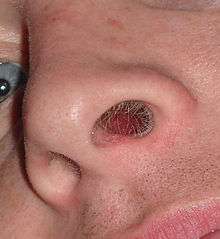Nasal hair
Nasal hair or nose hair is the hair in the nose. Adult humans have hair in the interior nasal passage. Nasal hair functions include filtering foreign particles from entering the nasal cavity and collecting moisture.[1] In support of the first function, the results of a 2010 study indicated that increased nasal hair density decreases development of asthma in those suffering from seasonal rhinitis, possibly due to an increased capacity of the faces to filter out pollen and other allergens.[2]
Nasal hair should not be confused with cilia of the nasal cavity, which are the microscopic cellular strands that, unlike macroscopic nasal hair, draw mucus up toward the pharynx via their coordinated, back-and-forth beating.
Removal
A number of devices have been sold to trim nasal hair, including miniature rotary clippers and attachments for electric shavers. The trimmers shorten the hair to such lengths that they do not appear outside of the nasal passage. A pair of tweezers may also be used to facilitate the removal of such hairs. Other means are in effect such as waxing. It might also be advisable to apply an antiseptic cream after treatment on the end of a cotton swab to reduce the risk of infection and soreness.
See also
References
- ↑ Blume-Peytavi, Ulrike; Whiting, David A.; Trüeb, Ralph M. (2008). Hair Growth and Disorders. Berlin: Springer. p. 10. ISBN 3540469087.
- ↑ Ozturk, A.B.; Damadoglu, E.; Karakaya, G.; Kalyoncu, A.F. (2011). "Does Nasal Hair (Vibrissae) Density Affect the Risk of Developing Asthma in Patients with Seasonal Rhinitis?". International Archives of Allergy and Immunology. 156 (1): 75–80. PMID 21447962. doi:10.1159/000321912.
